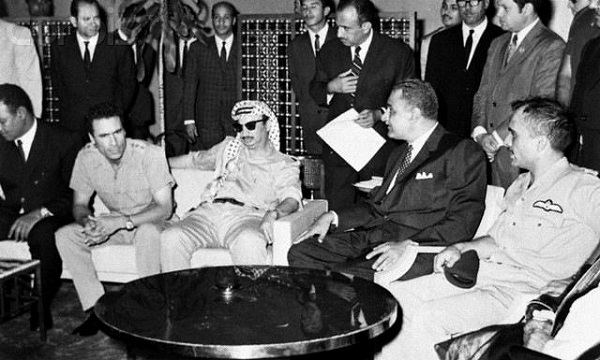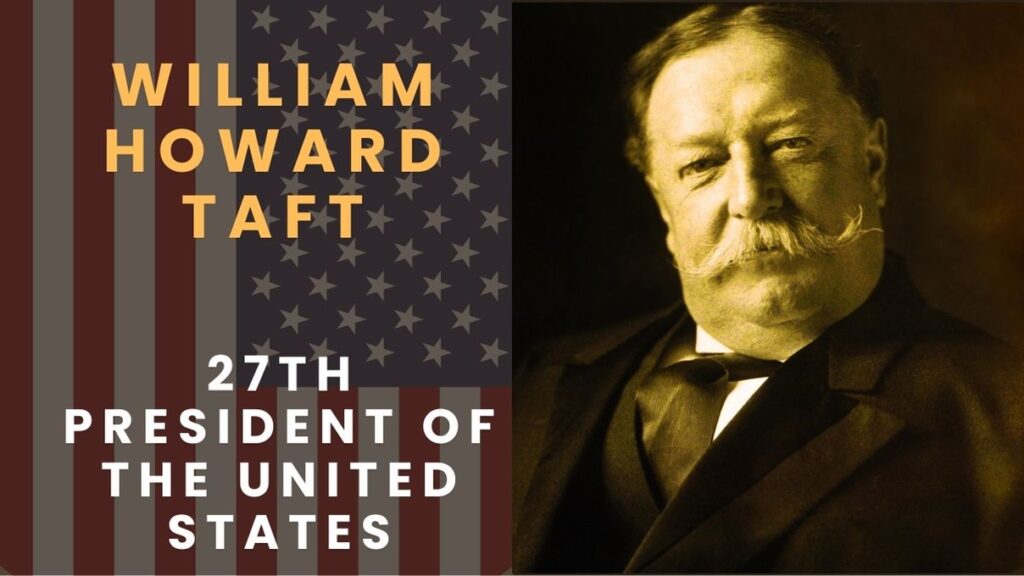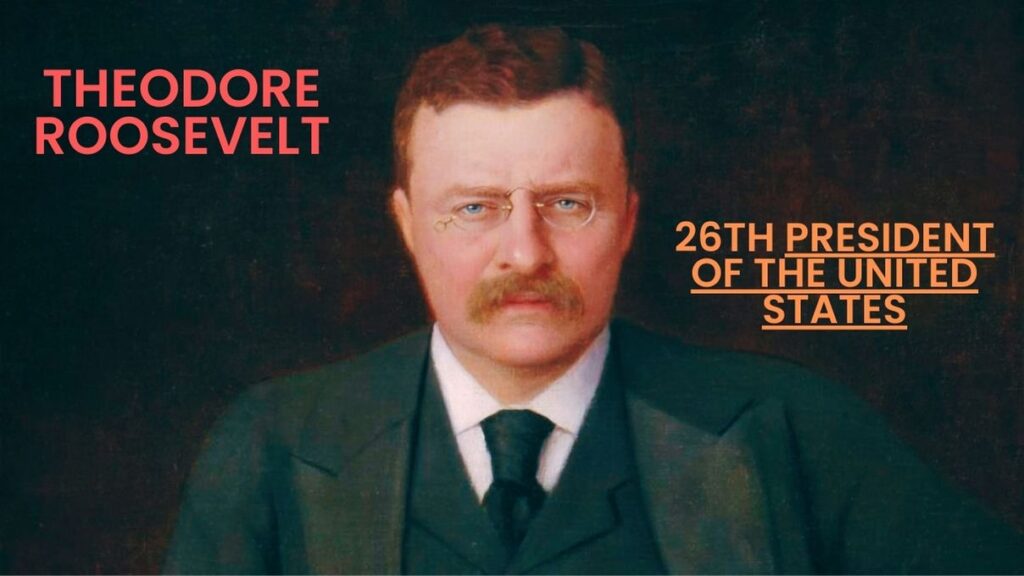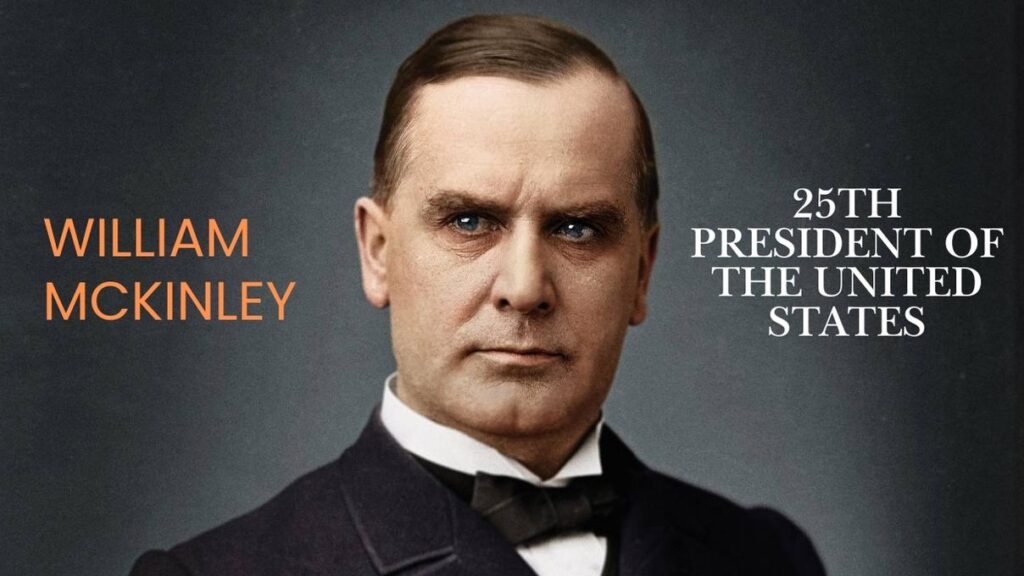Palestine Liberation Organization (PLO)
he Palestine Liberation Organization (PLO) is a political entity that claims to represent the Palestinian people, descendants of Arabs who lived in the region of mandated Palestine before the establishment of the State of Israel in 1948. Formed in 1964, the PLO’s mission was to centralize various clandestine resistance movements under one umbrella organization. Following the Six-Day War of 1967, the PLO became a prominent player in the ongoing struggle for Palestinian self-determination.
Foundation and Early Development
After the Arab Israeli war of 1948, the Arab states, notably Egypt, took the lead in the political and military struggle against Israel. Dispersed among several countries and lacking organized central leadership, many Palestinians formed small, diffuse resistance organizations, often under the patronage of various Arab states, which limited Palestinian political activity.
The PLO’s first chairman, Ahmad Shuqayrī, was closely tied to Egypt. Its military force, the Palestine Liberation Army (formed in 1968), was integrated into the armies of surrounding Arab states, and the militant guerrilla organizations under its auspices had limited influence on PLO policy. Although the PLO received funding from taxes levied on the salaries of Palestinian workers, for decades the organization also depended heavily on contributions from sympathetic countries.
Expansion and the Rise of Yasser Arafat
After the Arab states’ defeat by Israel in the Six-Day War of June 1967, the PLO began to be widely recognized as the representative of the Palestinians and promoted a distinctively Palestinian agenda. The defeat discredited the Arab states, and Palestinians sought greater autonomy in their struggle with Israel. . The more radical factions have remained steadfast in their goals of the destruction of Israel and its replacement with a secular state in which Muslims, Jews, and Christians would ostensibly participate as equals. Moderate factions within the Palestine Liberation Organization (PLO) , however, have been willing to accept a negotiated settlement with Israel that would yield a Palestinian state, leading to occasional internecine violence.
leader of Fatah
In 1969, Yasser Arafat, leader of Fatah, was named the PLO’s chairman. From the late 1960s, the PLO organized and launched guerrilla attacks against Israel from its bases in Jordan, prompting significant Israeli reprisals and leading to instability within Jordan. This conflict escalated in 1970, culminating in the PLO’s forcible expulsion from Jordan by the Jordanian army in 1971. During this time, factions within the PLO shifted from attacks on military targets to a strategy of terrorism—a policy the organization fervently denied embracing. High-profile attacks, including bombings and aircraft hijackings, were staged by PLO operatives against Israeli and Western targets.
Yasser Arafat
From 1974, Arafat advocated ending the PLO’s attacks on targets outside of Israel and sought international recognition of the PLO as the legitimate representative of the Palestinian people. In 1974, the Arab heads of state recognized the PLO as the sole legitimate representative of all Palestinians, and the PLO was admitted to full membership in the Arab League in 1976. However, the PLO was excluded from the negotiations between Egypt and Israel that resulted in the 1979 Camp David peace treaty, which returned the Israeli-occupied Sinai Peninsula to Egypt but failed to secure Israel’s agreement to establish a Palestinian state in the occupied territories of the West Bank and Gaza Strip.
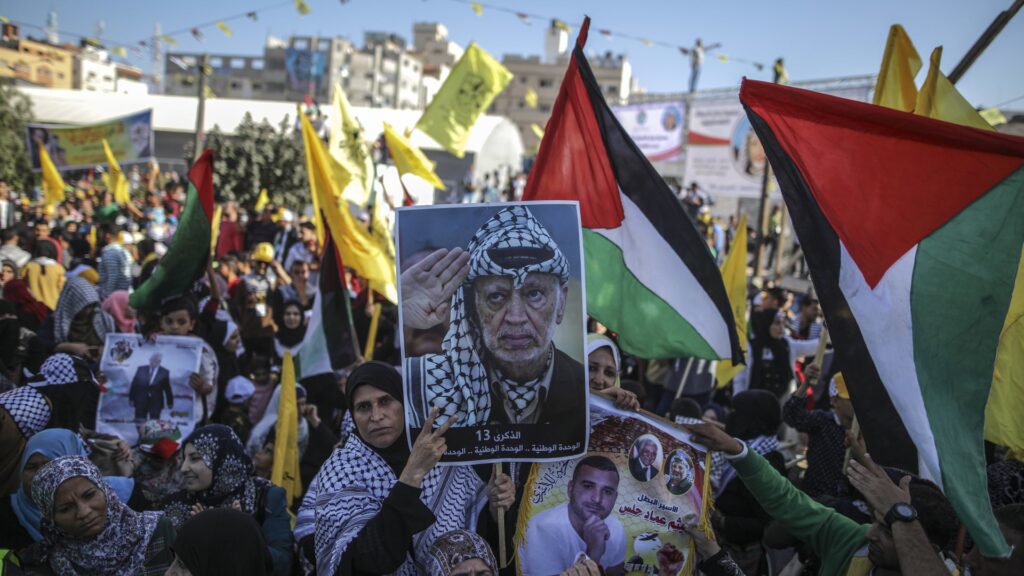
Israel’s Invasion of Lebanon and the PLO’s Relocation
Israel’s objective to dismantle the Palestine Liberation Organization PLO and its bases in Lebanon prompted the invasion of the country in June 1982. Israeli forces quickly encircled Beirut, which had served as the PLO’s headquarters for several years. Following negotiations, PLO forces evacuated Beirut and were relocated to sympathetic Arab nations.
Dissatisfaction with Arafat’s leadership grew as he withdrew to Tunis, Tunisia. In 1983, Syrian-backed PLO rebels, supported by Syrian troops, expelled Arafat’s remaining forces from Lebanon. Despite this setback, Arafat maintained support from some Arab leaders and ultimately reclaimed his leadership of the PLO.
Intifada and Oslo Peace Process
Deprived of bases from which to launch attacks against Israel and inspired by the success of the intifada (or “shaking off”), a mass uprising that commenced in 1987 in the occupied territories, the PLO leadership adopted a more adaptable stance toward peace with Israel. On November 15, 1988, the PLO declared the establishment of the “State of Palestine,” functioning as a government-in-exile. Subsequently, on April 2, 1989, Arafat was elected president of the Palestinian National Council (PNC). During this phase, the Palestine Liberation Organization PLO acknowledged United Nations Resolutions 242 and 338, implicitly recognizing Israel’s right to exist and abandoning its aim of replacing Israel with a secular, democratic state in favor of a two-state solution.
Arafat’s support for Iraq during the 1990–91 Persian Gulf War strained relations with key Gulf oil states, leading to a further moderation of the Palestine Liberation Organization PLO’s stance toward peace with Israel. In April 1993, under Arafat’s leadership, the PLO engaged in secret negotiations with Israel. Despite initial progress, negotiations faltered during the 1990s and collapsed entirely with the outbreak of a second intifada in late 2000.
Second Intifada, Mahmoud Abbas, and Statecraft Challenges
Following Arafat’s death in November 2004, Mahmoud Abbas, a prominent Fatah member and the first PA prime minister, assumed leadership of the PLO before later becoming president of the PA. The second intifada, dubbed the “al-Aqṣā intifada,” assumed a religious dimension, with militant Islamic factions like Hamas gaining significant traction. In the 2006 PA legislative elections, Hamas secured a majority, challenging the Palestine Liberation Organization (PLO)’s dominance.
Tensions between the PLO and Hamas reached a climax in 2007, culminating in armed conflict in the Gaza Strip, resulting in Hamas assuming control of the region. Abbas dissolved the Hamas-led legislature and established an emergency cabinet, reinstating Palestine Liberation Organization PLO authority in the West Bank, albeit with the lasting loss of Gaza.
And Statecraft Challenges
Empowerment The integration of the Palestine Liberation Organization PLO and the PA persisted into the 2010s, with both entities sharing leadership responsibilities while Hamas remained outside the PA. In 2012, the Palestine Liberation Organization PLO’s status at the UN was elevated to non-member observer state under the name “Palestine,” prompting the PA to adopt the name “State of Palestine” in official documents.
Unilateral actions, compounded by the absence of substantive peace negotiations post-2008, undermined the Oslo Accords. The PA’s pursuit of international recognition of statehood and Israel’s continued expansion of settlements in the West Bank complicated final status issues, such as Jerusalem’s status and the delineation of Israeli-Palestinian borders. In 2017, the US recognized Jerusalem as Israel’s capital, while in 2020, Israeli leaders deliberated annexing parts of the West Bank, further complicating negotiations. Palestine Liberation Organization (PLO)

